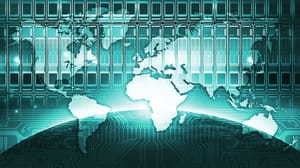Hydrogen Power: Microsoft, Caterpillar Data Center Partnership Earns Top DOE Award
An ambitious hydrogen fuel cell project underscores the rising interest in sustainable power solutions for data centers.

Caterpillar, in collaboration with Microsoft and Ballard Power Systems, has been recognized for its work in data center hydrogen fuel cell technology, winning the ‘Systems Development and Integration’ award at the US Department of Energy’s (DOE) 2024 Hydrogen Program Merit Review Awards.
The recognition arrives as the data center industry faces mounting pressure to address its soaring energy needs with sustainable solutions. Advocates say hydrogen fuel cells could help meet reliability and environmental goals, especially as backup power.
The project, hosted at Microsoft’s Cheyenne, Wyoming, data center, tested the feasibility of large-format hydrogen fuel cells for reliable backup power over a simulated 48-hour outage.
Two Cat Power Grid Stabilization (PGS) 1260 battery energy storage systems were employed alongside a 1.5 MW hydrogen fuel cell.

Caterpillar’s senior engineering project team lead Paul Wang accepted the DOE award (Image: Caterpillar)
Caterpillar took charge of system integration, power electronics, and microgrid controls, while Ballard Power Systems provided the hydrogen fuel cell module.
The project received partial funding and support from the DOE’s H2@Scale initiative and the National Renewable Energy Laboratory (NREL).
The initiatives highlight a growing focus on hydrogen as a pathway toward zero-emissions data centers and sustainable energy alternatives in the data industry.
The use of alternative and sustainable power sources for data centers is likely to become an even greater concern as the impact of AI on data center power consumption causes energy demands to soar.
Hydrogen Power for Data Centers: An Emerging Trend
Hydrogen power is already being explored by data center operators. For more than a decade, Bloom Energy has supplied solid oxide fuel cells (SOFCs) to a wide range of organizations, including digital infrastructure providers, running hydrogen as a power source, albeit mostly as a secondary power source.
In June, data center provider ECL launched MV1, an off-grid, hydrogen-powered modular data center in Mountain View, California.
Yuval Bachar, founder and CEO of ECL, said the company has a one-gigawatt project in Texas that is connected directly to a hydrogen pipeline and will come online within the next 12 months.
“We can scale it to any size we want, depending on the amount of hydrogen we can source,” he told Data Center Knowledge. “When you look at the problem of delivering hydrogen to data centers today and to operate on hydrogen-based systems, the issues have been solved.”

ECL’s hydrogen-powered data center concept has been designed with scalability in mind (Image: ECL)
Benefits of Hydrogen-Powered Data Centers
Sean Farney, vice president of data center strategy at JLL Work Dynamics, said the key benefit of using hydrogen fuel cells is that it’s considered a sustainable and green technology.
He said with all the major hyperscale data center operators having strict ESG goals around reducing their carbon footprint, hydrogen is attractive because it has far lesser particulate emissions and a much smaller carbon footprint.
“The carbon fuel cell methodology that appears to be winning and is most prevalent is the solid oxide fuel cells, which leverage a fossil fuel like natural gas on the back end to create the energy,” he told Data Center Knowledge.
In this case, it is not completely free from carbon impact, but it presents a lower footprint.
“It all depends on whether it’s used as a primary or secondary source,” Farney said. “It’s a sustainability play.”
A Solid Backup Plan
Gartner analyst Bob Johnson said he thinks hydrogen fuel cells have great potential as a backup, especially when much of the new grid supplies are renewables which are not 24/7 reliable.
He noted that while batteries are being talked about as a backup source, they are extremely expensive for utility scale batteries and most installations he’s seen only provide around four hours of output.
“In contrast, hydrogen fuel cells, especially if running on natural gas, can keep going indefinitely,” he said.
Gartner analyst Lloyd Jones said the main advantage hydrogen has now is availability, noting that nuclear-powered data centers are still some way from widespread adoption.
He said that while Amazon has made a deal for power from the Susquehanna nuke plant, and Microsoft is re-starting Three Mile Island, the reality is that there aren’t that many nuclear-power plants available for re-start or to make deals with.
“Hydrogen is available now,” he said.

Harnessing hydrogen power in data centers offers potential benefits including reliable backup solutions, reduced emissions, and enhanced sustainability (Image: Alamy)
Farney agreed it’s a technology that can spin up relatively quickly, so there is not a long install or wait time.
“Today, with this AI power gold rush, the time to revenue is important, and hydrogen offers quick turnaround in the manufacturing of these fuel cells and for capital and procuring equipment,” he said.
Farney added that hydrogen power comes with a much better regulatory environment as well.
��“It can be implemented rather easily and quickly contrasted to nuclear, which has an incredibly strict regulatory environment in the US and in other places around the world,” he explained.
Hydrogen also doesn’t have the negative perspective around safety and risk that nuclear does in the overall investment of the plant.
“You can build a small multi-megawatt hydrogen energy deployment quickly,” he said. “With nuclear, there is some scale involved still – you have to build it large enough to make the economics work.”
Procurement of the materials to manufacture the energy is also substantially different.
“Hydrogen uses natural gas, which is achievable and attainable,” Farney said. “With nuclear, there are some severe restrictions on who gets the material to used generate the power. Uranium and plutonium are highly regulated.”
Challenges to Deploying Hydrogen Power in Data Centers
Johnson said among the drawbacks of the technology is that hydrogen is “extremely difficult” to store and transport, but he added those are problems that will “inevitably” be solved in the future.
“Another challenge is getting a reliable, fully green source of the hydrogen,” he said.
Hydrogen needs to be liquified to be transportable, and because the molecule is so small, requires specialized technology to store it.
Because hydrogen does not have the energy density of natural gas, more cubic feet are needed for the same amount of power.
While some fuel cells can extract hydrogen from natural gas (with some CO2 emissions), and this can be problematic when sustainability goals are concerned.
Another issue is scale – simply building up the fuel cell industry to the scale needed.
From Farney’s perspective, the barriers for hydrogen are coming down.
“It is like liquid cooling, which is now openly embraced because of AI’s power density,” he said. “Hydrogen has had some negative perception in the past.”
He noted neighboring communities were worried that they could be in proximity to a hydrogen bomb – fears based on uncertainty, doubt, and a lack understanding.
Another issue is a lack of community awareness and standard operational procedures.
Read more of the latest data center sustainability news
“It’s not normalized, so it's perceived even to the local authority having jurisdiction as something that is not buttoned up from an operational perspective,” Farney said. “That leads to fear, uncertainty, and doubt.”
Bachar pointed out that hydrogen is a safe fuel when managed properly, citing its properties and the rigorous protocols designed for its handling.
“Hydrogen is non-toxic and, if released, dissipates rapidly into the atmosphere, reducing risks of accumulation or explosion,” Bachar said.
Unlike conventional fuels, hydrogen is lighter than air, so it disperses quickly when leaks occur, preventing large concentrations that might lead to hazardous conditions.
Additionally, the industry has established stringent standards for hydrogen storage and transportation, which include specialized tanks and sensors to detect leaks.
“Our technology integrates multiple layers of safety checks,” Bachar said.
He added that advancements in materials and monitoring help ensure that hydrogen systems meet or exceed regulatory safety standards.
“When properly stored and used, hydrogen is as safe as traditional fuels and holds significant potential as a clean energy source,” Bacher said.
Read more about:
Green ITAbout the Author
You May Also Like
.webp?width=100&auto=webp&quality=80&disable=upscale)
.webp?width=400&auto=webp&quality=80&disable=upscale)







